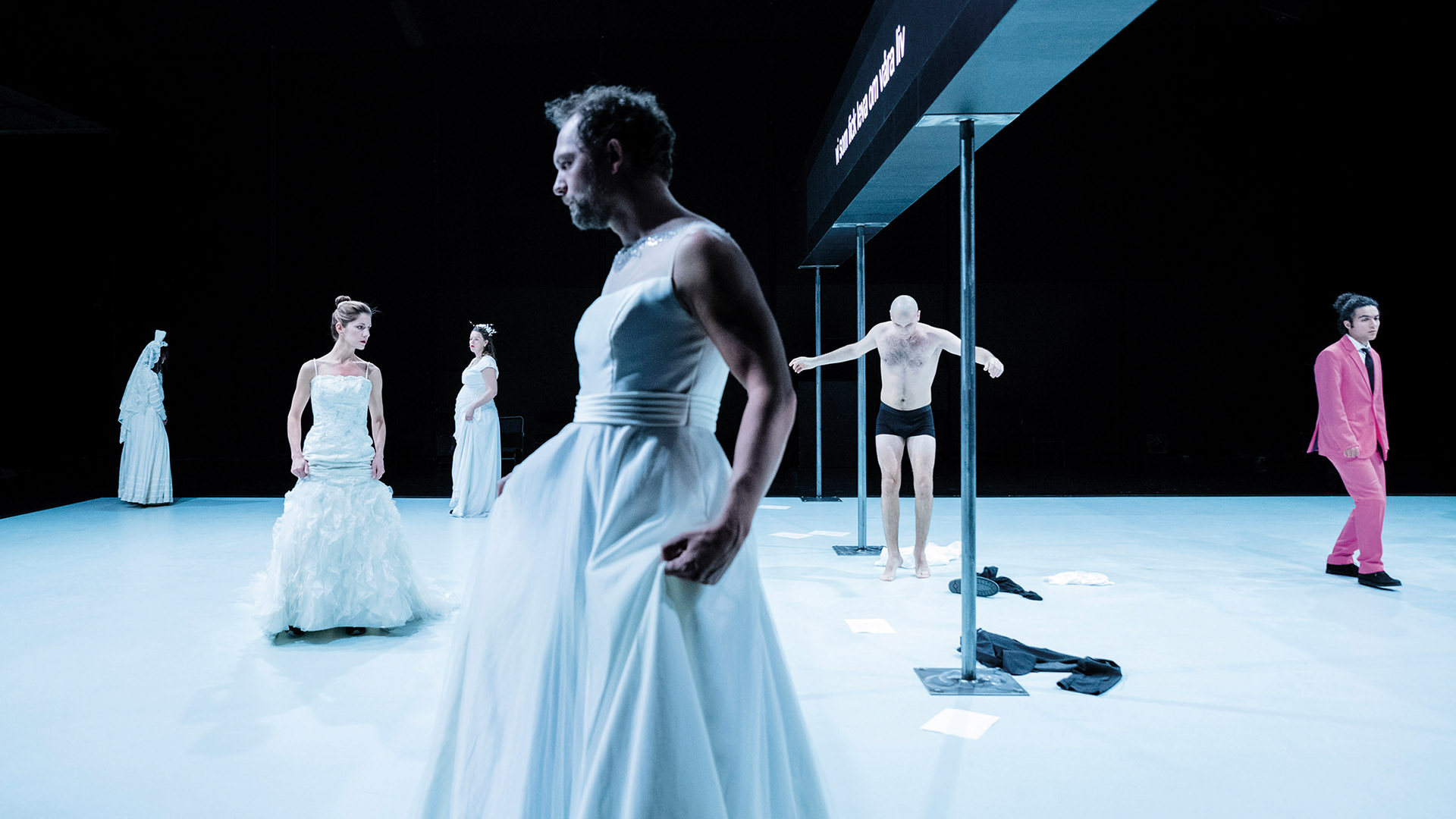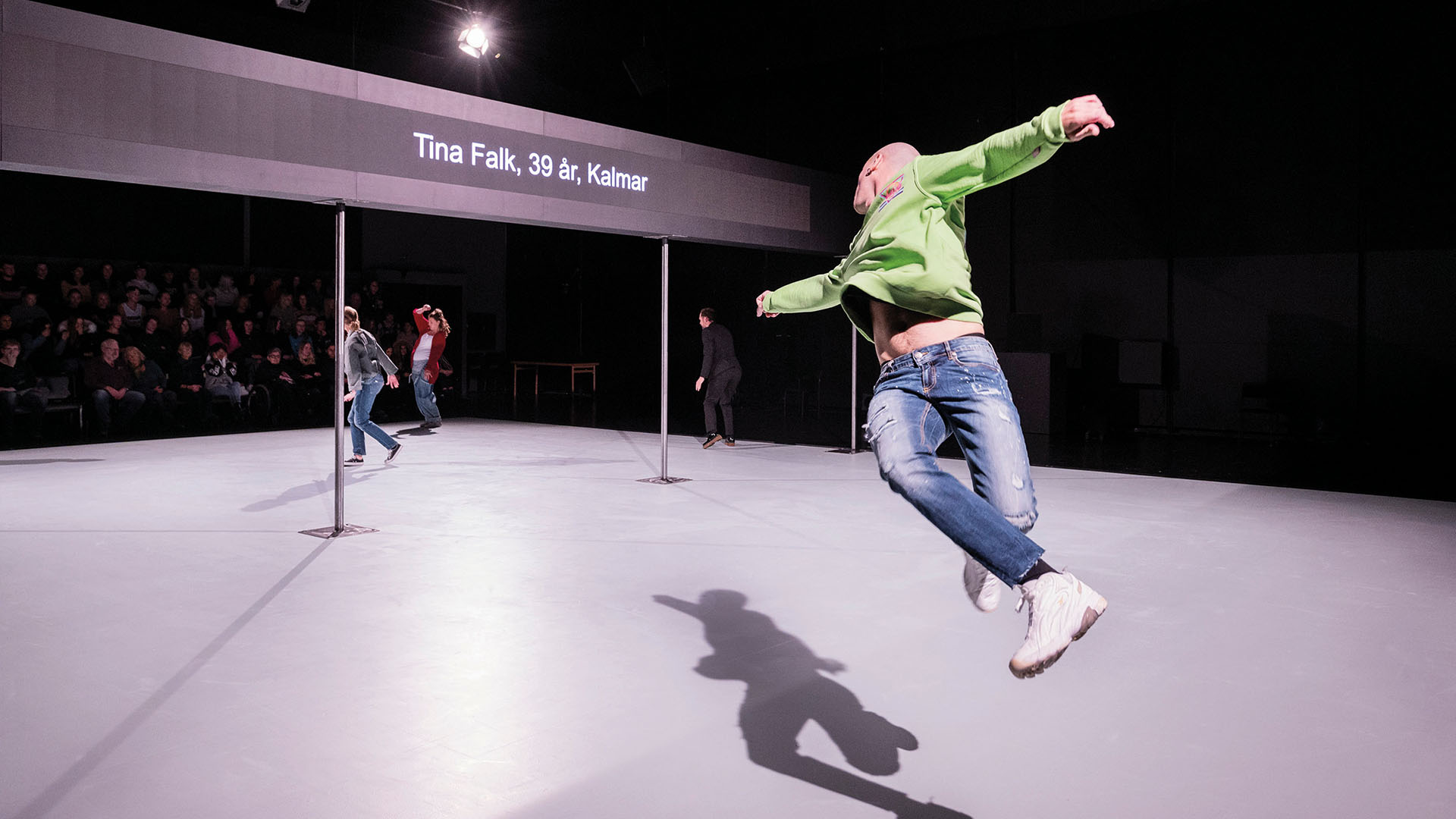

An actor turned playwright, now art director of the most important theatre in Sweden: The Royal Dramatic Theatre (the Dramaten) in Stockholm: Anderson brings his new show Vi som fick leva om våra liv (We Who Lived Our Lives Over) to Venice.
Once upon a time, there was Sweden. A beautiful, pristine land, an example of social democracy and a champion of human rights. Free, easy, friendly. A job for everyone. I lived and worked there during the 1980s. I loved how attentive Sweden was to people’s needs, and I loved its motivational industrial culture. I remember once visiting a prison outside Gothenburg: rowhouses surrounded by greenery, no fences around them, and a TV in every room. The world changes, though, and Mattias Andersson will be our witness and our eye on the times. Andersson is an actor turned playwright, now art director of the most important theatre in Sweden: The Royal Dramatic Theatre (the Dramaten) in Stockholm, an institution that oversaw the growing careers of Greta Garbo, Ingrid Bergman, Max von Sydow, Bibi Andersson, among others. Before that, Mattias Andersson had been art director at the Backa Theatre in Gothenburg for fifteen years. On June 21 and 22, we will meet Andersson at the Arsenale with Vi som fick leva om våra liv, or We Who Lived Our Lives Over. We wanted to get to know him better.
One of the Biennale’s priorities is the education and mentorship of young artists. Tell us more about why you chose theatre and about your earlier experiences.
I got my education as an actor at the University College of Acting in Gothenburg, and I have been writing plays since I was in high school. Over the years, I kept on writing, both when I worked as an actor and as a director. I got my job at Backa as its art director in 2007, and since 2020, I work in the same capacity at the Dramaten.
How was life before 2007?
Harder. I wanted so much to see my plays on stage, but often I just couldn’t get the means to do it. Sometimes, I was able to start a production thanks to public funds, other times, I would finance it myself. I was always hustling; I did everything I could to just be at theatre all the time. I worked as a janitor, as well. I wasn’t even twenty, and theatre was all I could think about.

I saw your play The Misfits in Bologna in 2016. A raw story on wasted youth, marginalization, scapegoating in a society built on money and power. The show is, in a way, an example of your time at Backa and of theatre itself.
The Backa is similar to a social project and speaks to a diverse audience in terms of socio-economic class, and ethics, too. It has been very interesting to make theatre and at the same time to make meaning, to understand current social issues using art, and not the usual pedagogy. The audience was given alternative tools to understand and reflect on the world we live in; however, it has never been our intention to force one vision or the other unto the audience.
Theatre also means entertainment. How does entertainment figure into your work?
Of course. I and everyone else need this, and will for generations. Obviously, any show must be attractive and entertaining, although entertainment doesn’t necessarily mean shallowness or avoidance of important questions. The audience must develop an interest in this form of art, they must feel some attraction. My wish is for the theatre experience to live on for generations.
What will your role be?
I am a playwright first. Even though in this last work, I based by writing on documents and real events, text is my creation alone. In the show we will bring to Venice, I make full use of interviews conducted by sociologists and researchers, but that is only the raw material. My work stands on its own.
How did you work on your play?
I began by analysing the interviews, hundreds of pages to study. I then started writing to give rhythm to the same interviews, which is what shapes the show overall. I placed actors in an open field, and paired different people to different texts. I also used the work of a choreographer, which means there will be some dance in the final version. This is collective work, also thanks to contributions the actors gave over rehearsal. We took steps forward and steps back. Sometimes, I rewrote full passages. Change large or small took place all the time, and everybody needed to be ready to start over again each time. Actors are agents of change, and change they must accept even up to the last minute. In the end, thirteen actors will be on stage, though over a hundred contributed in some way or other to the final script. Working at Dramaten is not easy, it is the largest theatre in the country, with many productions. The attention of the media is intense, which means the shows must be of the highest quality.

You worked on Nordic crime, which has become very popular in Italy and all over Europe. We also noticed a certain attention devoted to Dostoevsky…
I worked on a very specific Nordic crime project. This genre surely brought quite some gore on the screen: violence mixed with entertainment right at dinner time. These productions certainly drive a specific narrative on our society. Personally, I tried to add some documentary into it. It is very interesting how the TV industry reproduces stereotypes and narratives on modern societies by portraying its fascination with violence, which certainly exists and is growing. I agree with most commentators: showbusiness contributed greatly to this growth. I took some inspiration from Dostoevsky for Swedish film and radio, from Crime and Punishment, especially. I was particularly interested in the theme of forgiveness, the absolute value of the human being, and ethics in the context of murder.
Do you think theatre must fight violence?
Theatre is, today, an alternative to the individualistic experience of our micro-platforms: smartphone, tablets, computers… Theatregoing means to come together in a same room and live an experience together with other people. In this sense, theatre drives empathy and humanity. It drives possible mutual understanding. I don’t think the show will be interactive, per se, but the mere fact of sharing a common experience creates a form of dialogue, which is immensely different and certainly more social than spending hour after hour on TikTok, Instagram, or YouTube, alone in one’s room. There’s a difference, and what a difference!
We shall ask of you the essential question of your show: what would you do if you were to live your life a second time?
Quite a dramatic question, because it forces you to think of what you own, of what you built, of what success you had in life. Obviously, I consider myself privileged. I live in a country that allows a high quality of life. Sometimes, though, I think we ought to work more for others than we do for ourselves. I don’t know, it seems to me that there’s something narcissistic in making art. Social pressure is always strong. To get a job that is more oriented to helping others, like social worker or teacher, might do something to ease some of that pressure. However, a playwright is always something of a social worker…
Featured image: Mattias Andersson © Dramaten